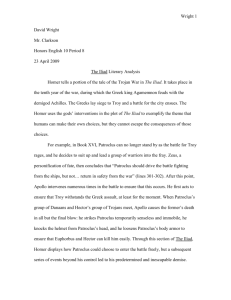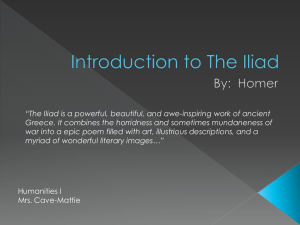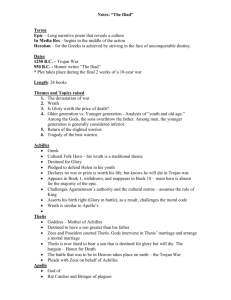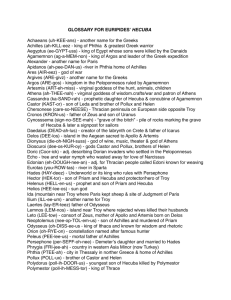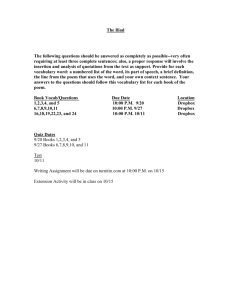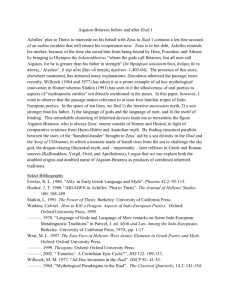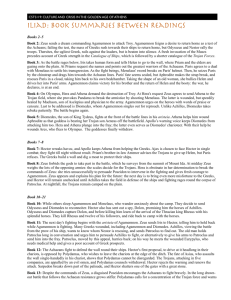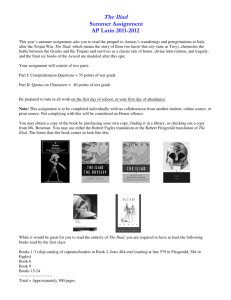Illiad/Troy Character Sheet
advertisement
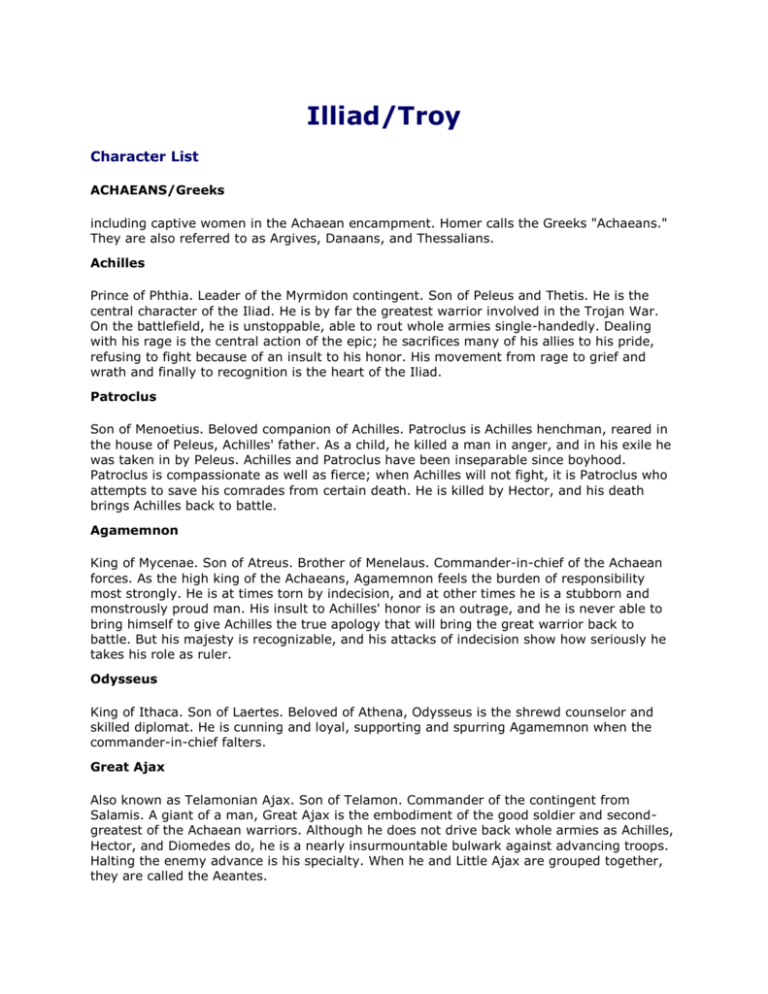
Illiad/Troy Character List ACHAEANS/Greeks including captive women in the Achaean encampment. Homer calls the Greeks "Achaeans." They are also referred to as Argives, Danaans, and Thessalians. Achilles Prince of Phthia. Leader of the Myrmidon contingent. Son of Peleus and Thetis. He is the central character of the Iliad. He is by far the greatest warrior involved in the Trojan War. On the battlefield, he is unstoppable, able to rout whole armies single-handedly. Dealing with his rage is the central action of the epic; he sacrifices many of his allies to his pride, refusing to fight because of an insult to his honor. His movement from rage to grief and wrath and finally to recognition is the heart of the Iliad. Patroclus Son of Menoetius. Beloved companion of Achilles. Patroclus is Achilles henchman, reared in the house of Peleus, Achilles' father. As a child, he killed a man in anger, and in his exile he was taken in by Peleus. Achilles and Patroclus have been inseparable since boyhood. Patroclus is compassionate as well as fierce; when Achilles will not fight, it is Patroclus who attempts to save his comrades from certain death. He is killed by Hector, and his death brings Achilles back to battle. Agamemnon King of Mycenae. Son of Atreus. Brother of Menelaus. Commander-in-chief of the Achaean forces. As the high king of the Achaeans, Agamemnon feels the burden of responsibility most strongly. He is at times torn by indecision, and at other times he is a stubborn and monstrously proud man. His insult to Achilles' honor is an outrage, and he is never able to bring himself to give Achilles the true apology that will bring the great warrior back to battle. But his majesty is recognizable, and his attacks of indecision show how seriously he takes his role as ruler. Odysseus King of Ithaca. Son of Laertes. Beloved of Athena, Odysseus is the shrewd counselor and skilled diplomat. He is cunning and loyal, supporting and spurring Agamemnon when the commander-in-chief falters. Great Ajax Also known as Telamonian Ajax. Son of Telamon. Commander of the contingent from Salamis. A giant of a man, Great Ajax is the embodiment of the good soldier and secondgreatest of the Achaean warriors. Although he does not drive back whole armies as Achilles, Hector, and Diomedes do, he is a nearly insurmountable bulwark against advancing troops. Halting the enemy advance is his specialty. When he and Little Ajax are grouped together, they are called the Aeantes. Menelaus King of Lacedaemon. Son of Atreus. Brother of Agamemnon. Husband of Helen. Often in his brother's shadow, Menelaus is still a strong warrior and at times an effective leader. The abduction of his wife Helen is the cause of the Trojan War. Diomedes Prince of Argos. Son of Tydeus. Never one to shrink from a fight, Diomedes cries out for battle whenever the possibility of withdrawal is mentioned. He is given great strength by Athena in Book 5, and slaughters countless Trojans. He also accompanies Odysseus during the night raids of Book 10. Idomenus Son of Deucalion. Leader of the Cretan contingent. He and Meriones lead a staunch counterattack on the left side of the battlefield in Book 13. Even at Hector's high tide, Idomenus and Meriones manage to make the Trojans pay a heavy price in lives. Calchas Son of Thestor. He is a great prophet. He correctly diagnoses the cause of the plague in Book 1. Chryseis Daughter of Chryses. Captive of Agamemnon. When Agamemnon refuses her father's ransom, Apollo brings plague on the Achaeans. TROJANS and their Allies Troy is also referred to as Ilium. Hector Prince of Troy. Son of Priam and Hecuba. Husband of Andromache. Greatest of the Trojan warriors, he is the champion of his people. He is a civilized man, more suited to peacetime than to war. When he slays Patroclus, he brings Achilles back into battle. Hector, in turn, is killed by Achilles. . Priam King of Troy. Son of Laomedon. Father of Hector, Paris, and many other Trojan heroes. An old man with no appetite for war, Priam watches the battles from the ramparts of Troy. He ransoms Hector's body at the end of the epic. Helen Daughter of Zeus. Wife of Menelaus. Consort of Paris. Paris' abduction of Helen is the cause of the Trojan War. Nine years later, she is wracked by remorse for the havoc she has caused. At times, she is full of disdain for her new husband Paris. Paris Also called Alexander. Prince of Troy. Son of Priam. Husband of Helen. His choice of Aphrodite in the beauty contest of the goddesses wins him Helen. Helen's abduction causes the Trojan War. Paris is a strong fighter, but he has little appetite for battle. His greatest skills remain those of the bedroom. Hecuba Queen of Troy. Daughter of Dymas. Wife of Priam. Mother of Hector. Hecuba fears for the fate of her husband when he goes to ransom Hector's body. Earlier, she watched from the ramparts with horror as Achilles desecrated the corpse of her most beloved son. Chryses Priest of Apollo. Father of Chryseis. Agamemnon's rejection of Chryses' offer to give ransom for his daughter leads to plague among the Achaean troops. GODS and Demi-Gods. Zeus King of the gods. Son of Cronus and Rhea. Brother and husband of Hera. Father of the Olympian gods and many mortals, including Sarpedon. Zeus is the strongest of the gods, lord of the sky and wielder of the lightning bolt. He is the governor the universe, deciding the destinies of men, but he must sometimes act in accordance with fate. Hera Queen of the gods. Daughter of Cronus and Rhea. Sister and wife of Zeus. Jealous, scheming, and powerful, Hera hates the Trojans fiercely and works for their destruction. She cannot overpower Zeus, but she can outwit him. Athena Also known as Pallas Athena and Tritogenia. Daughter of Zeus. Goddess of war, wisdom, and crafts. She is a tireless defender of the Achaeans, and she bears strong hatred for Troy. She has a special affection for Odysseus, whose wiliness makes him her favorite among mortals. Thetis Daughter of Nereus, the Old Man of the Sea. Wife of Peleus. Mother of Achilles. Zeus and Hephaestus are both indebted to her, and she calls in on the debts on behalf of her son. Through her mortal son, she suffers, and she is able to foresee all of the calamities that will befall him. Apollo Son of Zeus and Leto. God of archery and music, Apollo is a great champion of the Trojans. He bears no great love for Achilles, and foils Achilles on several occasions. He also makes possible the brutal and unfair killing of Patroclus. Artemis Daughter of Zeus and Leto. Goddess of archery and the hunt, she favors the Trojans but not with the vigor of her brother. Poseidon Son of Cronus and Rhea. Brother of Hera, Hades, and Zeus. A powerful god, Poseidon is lord of the sea and earthquakes. Because of a wrong done to him by Laomedon, Priam's father, Poseidon hates the Trojans and sides with the Achaeans throughout the war. Aphrodite Daughter of Zeus and Dione. Mother of Aeneas. Goddess of love. Helen and Paris are among her favorites, and Aphrodite fights on the side of Troy. Of little use on the battlefield, in her own realm she reigns supreme. Hera uses a token of her power to overcome Zeus himself. Hephaestus Son of Zeus and Hera. Crippled smith of the gods, lord of the forge and fire. In Book 18, he makes Achilles his new magnificent armor and shield. He rescues Achilles from the river god Xanthus in Book 21. Ares Son of Zeus and Hera. Bloodthirsty god of war, more frenzied (but also less powerful) than his half-sister Athena. He is a protector of the Trojans. Leto Consort of Zeus. Mother of Artemis and Apollo. She sides with Troy because her children do. Hermes Son of Zeus. Guide. He escorts Priam safely into the Achaean encampment in Book 24. Iris Others: Polyxena-Priams daughter Cassandra-sister to Paris/phophetess doomed by Apollo to never be believed Eris-goddess of strife; not invited to Thetis’s wedding and threw the golden apple was for the fairest. Iphigenia-Agamemnon’s daughter sacrificed to Artemis Persephone-Goddess of death Major Themes The interaction between fate and free will A complicated theme, the interaction between fate and free will is present in every book of the Iliad. At times it seems that men have no real freedom. The gods intercede repeatedly, altering events as they please. But Homer was no determinist, and there is a place in the Iliad for human agency. At key points, Homer makes it clear that mortals make important choices, and a few times mortals nearly overturn the dictates of fate itself. Zeus's will determines much of fate, but even he is sometimes subject to a higher necessity that is never personalized in the Iliad. Pride Pride is a theme of pivotal importance, not only for the Iliad, but for all of Greek literature. Where pride in Christianity is a vice paired off against the central Christian virtue of humility, pride to the ancient Greeks was the source of both ruin and greatness. The central hero of Christianity, Jesus Christ, is the embodiment of humility. Divine, he suffers humiliation that not even mortals should bear. In contrast, it is hard to imagine a male heroic Greek hero who is humble; for the Greeks, pride is inextricable from heroic action. The pursuit of Glory Closely linked to the above theme, the pursuit of glory is a consuming occupation for Homeric heroes. A Homeric hero wins glory by performing great deeds, the memory of which will outlive him. There is no comforting afterlife in Homer. Shades go down to the gloomy world of Hades. Emphasis is on the deeds of this life for the sake of this life, and a hero must win glory that will be remembered always by the living even after he is gone. The glory of battle and the horror of war Homer has never been surpassed in his ability to portray both the beauty and horror of war. War brings out the best in his heroes, as they tap previously unknown reserves of strength, courage, and loyalty. But war also can bring out the worst in men. The endless carnage and cruelty of the poem dehumanizes many of the men of the Iliad, and Homer never shirks from depicting the brutality of battle. Although Homer glorifies warriors, the Iliad is full of an unmistakable love for peace.
